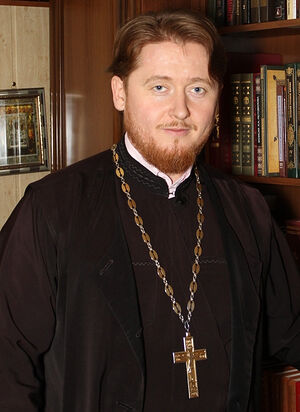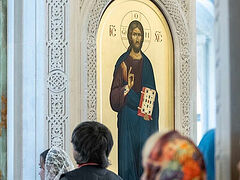On the radiant feast of the Nativity of Christ, everything around is filled with the joyful anticipation of miraculous events... Paradoxically, a miracle—an indescribable phenomenon—has a definition and even an explanation through the efforts of some. This is not irony at all, but an attempt to figure out what a miracle is, why and for whom it occurs and whether you should wait for it. Archpriest Alexander Milovanov, rector of the Church of Greatmartyr Catherine in the town of Novouzensk in the Saratov region, answers these and other questions.
 Archpriest Alexander Milovanov —Father Alexander, what is a miracle?
Archpriest Alexander Milovanov —Father Alexander, what is a miracle?
—A miracle is a phenomenon of religious life. But it can be viewed from two perspectives: religious and atheistic ones. Christian theology teaches that a miracle is an astonishing extraordinary phenomenon or event, the true reason for which is not in the laws of nature, but in a supernatural act performed by God to achieve certain goals. In other words, the Lord, Who created the laws by which the world exists, is not limited by them and acts both through them and directly.
—What kinds of miracles exist?
—A speaking partner of the philosopher and mathematician Gottfried Leibniz (1646–1716) said that a miracle is something that we seldom observe. It’s a shrewd remark. It can only be supplemented with the story about how representatives of the indigenous peoples of Russia’s Far North travelled to St. Petersburg to appeal for citizenship. The most surprising thing for them at the reception was bread. They wondered what it was and what it was made of. After listening to a detailed explanation of the production of bread, the northerners replied that it was a true wonder. Naturally, it was a miracle for them, because in the North agriculture is impossible.
But the most important miracle on which the Christian faith and our Church life are built is the Resurrection of Christ. This miracle is not dependent on the laws of nature and, therefore, it cannot be explained by them. It was performed by the power of the Godhead, and we can accept it only through our faith.
—What do miracles occur in our lives for?
—St. Ignatius (Brianchaninov), speaking about the miracles of Christ, said that the meaning of a miracle is not in the fact that it occurs, but that it encourages a non-believer to turn to God. Miracles that took place in the first centuries of Christianity were needed precisely by non-believers. But a miracle cannot be 100 percent irrefutable. The Lord gave us freedom of choice. We have the right to decide that what has happened is either something completely inexplicable and miraculous or something that science hasn’t yet explained. We have the right to choose whether to accept a miracle and thus learn and fulfill the will of the Creator, or not accept it, refusing to obey His laws. The Lord does not violate our freedom, and thus shows His mercy on us and love for us. In this case, a miracle is a reason to turn to God voluntarily, to take a step towards Him.
As for believers, they look at the world with spiritual eyes. For them a miracle is a confirmation that in addition to earthly life, where the laws of nature rule, there is another, metaphysical, supernatural realm. For believers, a miracle is God’s answer to their prayers. The Holy Fathers expressed the idea (I would call it an axiom), according to which miracles always have the following goals: to encourage, to heal and to enlighten. The clarity of the goal—bringing us nearer to salvation—remains the criterion of the Divine source of this phenomenon. A true miracle never occurs by chance and coincidence and it is always aimed at revealing the inner aspect of life to a person, helping him rise to a new spiritual level.
—What should be our attitude towards miracles?
—Orthodox Christians should take a neutral position on all unusual and supernatural phenomena. And the clergy should call all people to caution and sobriety. We should not build our faith on miracles, because they can come from both the Lord and the evil one. And it is very difficult for us to distinguish between these. There is not a single miracle in our fallen world that cannot be counterfeited. It is confirmed by the existence of false prophets and soothsayers who are passed off as “messengers of God”. St. John the Evangelist wrote: Beloved, believe not every spirit (1 Jn. 4:1). Let me remind you that a true miracle should guide a person to God, but what are the “agents of Divine truth” trying to achieve? They want to enslave people, making them listen to and obey their “spiritual leader”, turning them away from the fulfillment of the Gospel commandments.
The Church is not a miracle factory. We are not saved by miracles, but by our life in the Church. Some hunt for wonderworking, myrrh-streaming icons and relics, but the most important thing should be the renewal and “myrrh-streaming” of human souls. Of course, the Lord can surround us with miracles that will spiritually invigorate and inspire us, but it depends only on us whether we take a step towards Him or not. It seems to me that to be with God without reacting to miracles means to be on a high level of spiritual life. It is at this level that the relationship between God and a Christian should be.
—Why do you think people need a miracle to be convinced of something?
—The thirst for miracles indicates the weakness of our faith. If a person needs or demands a miracle for the development of his spiritual life, it means that he has problems in his relationship with God and in determining his place in this world. In his prayers to the Lord this person should ask for the acquisition of such faith, in the light of which all imaginary contradictions disappear and all kinds of evidence become unnecessary.
When a person constantly seeks miracles, gets used to them and misinterprets them, he can become spiritually withered. There is no answer, no miracle—and a feeling of God-forsakenness appears. In general, it is dangerous to hunt and wait for miracles. Take, for example, pilgrimages. I know people who find it difficult to pray at the Liturgy, but on Pascha they eagerly travel to the Holy Sepulcher, to holy springs, wonderworking relics and clairvoyant elders. At the same time, they don’t want to change their relationship with God, and continuing to live as before. In such a situation a miracle does not turn people to God, but quite the opposite.
—You said that miracles are mostly needed by non-believers. There is some contradiction here. On the one hand, a miracle is a phenomenon of religious life; and on the other hand, all people, believers and non-believers alike, wait for miracles and do not doubt their existence. Why?
—Every human being wants to believe. There are no non-believing people or nations in the world. There are isolated exceptions, but this is also a miracle. The existence of mentally ill people does not mean that all of humanity is insane. The same applies to those who call themselves atheists. A person who does not have a conscious faith acquired through much suffering, believes in anything. Isn’t the distribution in our country of millions of figures of yet another symbol of the coming year1 a manifestation of religiosity, the quest for the spiritual realm? People hope that these “animals” or “reptiles” will somehow help them achieve success and become happy.
—What miracles occur in our days, in your opinion?
—I think that in our time and for our people the conversion to the faith is a miracle. Religious scholars say that religious traditions have always been passed down from generation to generation, from the old to the young. Modern times have destroyed this stereotype: now children often come to believe in God first, then their parents, and then grandparents. Isn’t it a miracle? Such an order of conversion is contrary to logic, the laws of pedagogy and sociology.
When it comes to miracles in people’s lives, I’m sure everyone can recall some inexplicable events that cannot be assessed rationally. Miracles occur all the time. Miracles are part of our life and the world around us, our conversion to God, His patience, His answers to our prayers. All we need is to perceive and evaluate properly what happens to us. Suppose a person could not achieve some goal and was upset, but then he discovered that his failure was a manifestation of the good Providence of God. The Lord through sorrows saved him from the wrong path, on which he could have died not only spiritually, but physically.
—Father Alexander, you said that it is dangerous to crave for and even demand miracles. But what should we do? After all, we do pray for miracles. For example, for the healing of gravely ill people.
—The Lord said: Ask, and it shall be given you (Mt. 7:7). Of course, we must seek God’s help, but also remember the spiritual law, which teaches us to rely in everything on the will of the Lord, Who knows what we really need for our salvation.
The prayer of Christ Himself in the Garden of Gethsemane was as follows: O my Father, if it be possible, let this cup pass from Me: nevertheless not as I will, but as Thou wilt (Mt. 26:39). We see that we should ask for a miracle. St. John of Kronstadt, instructing the clergy, said that they should pray, demand and believe in the possibility of the fulfilment of what they asked for. Because the Lord commanded us: According to your faith be it unto you (Mt. 9:29). If ye then, being evil, know how to give good gifts unto your children, how much more shall your Father which is in Heaven give good things to them that ask Him (Mt. 7,11).
—If we cannot perform miracles, then can we at least be involved in their performance?
—Of course! The prerequisite for performing a miracle is your faith, hope and love, which you cultivate in yourself. We can do a good deed for our neighbor: encourage the faint-hearted, give advice to someone in a difficult situation, help someone in need, and so on. Surely all these people pray for help, and thus the Lord, Who acts in the world through people, gives us the opportunity to participate in miracles.
—Christmas is usually called the time of miracles. Do you agree with this opinion?
—This worldly postulate had a huge impact on Christian culture. In both European and Russian literature there is such a genre as a Christmas story. According to the plot, the usual course of things is disrupted at Christmas, which as a result leads to a change in the life and the internal disposition of the character. So people wait for good miracles. But don’t wait for miracles—do them! And, as you know, goodness returns to you.




